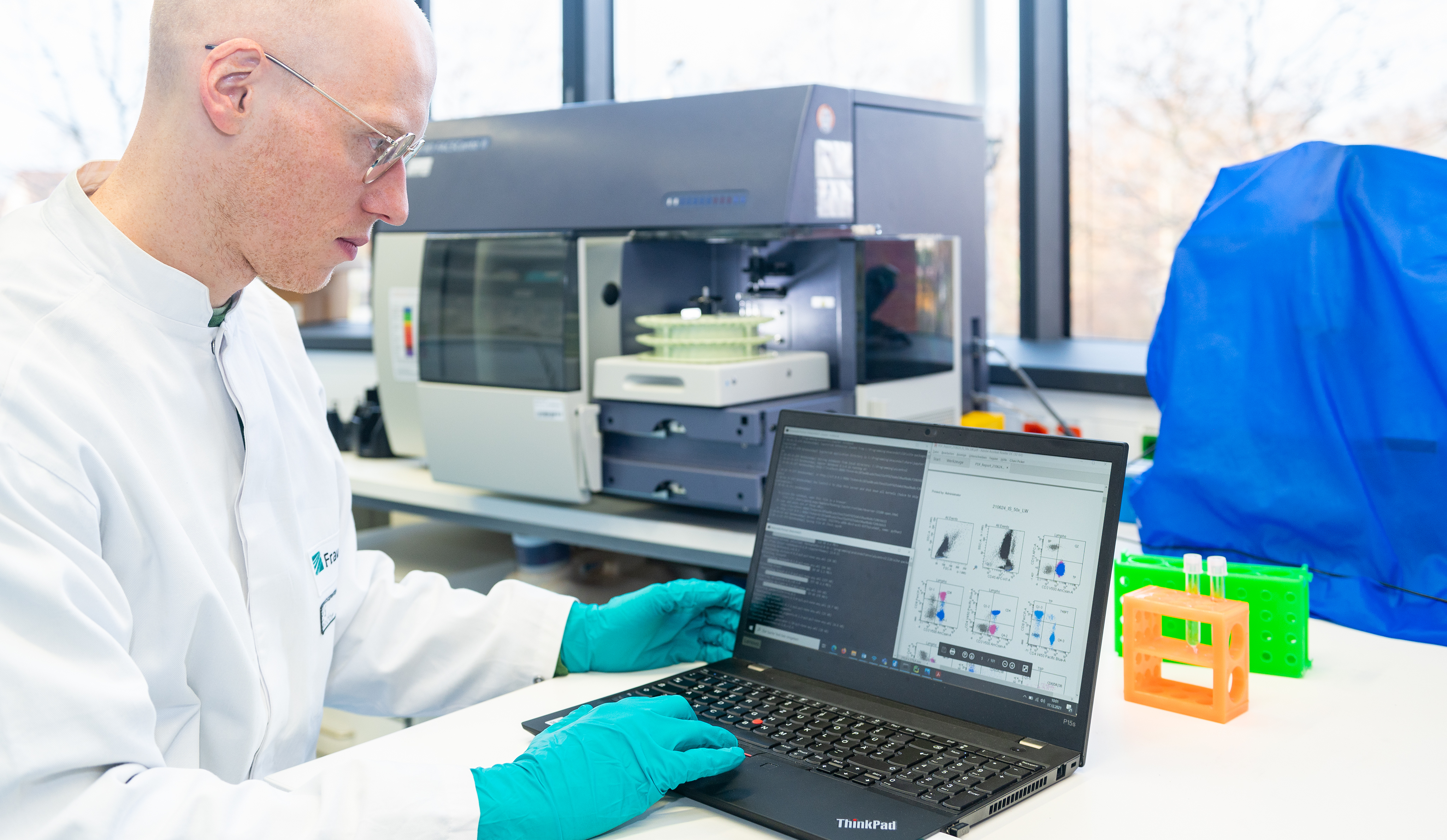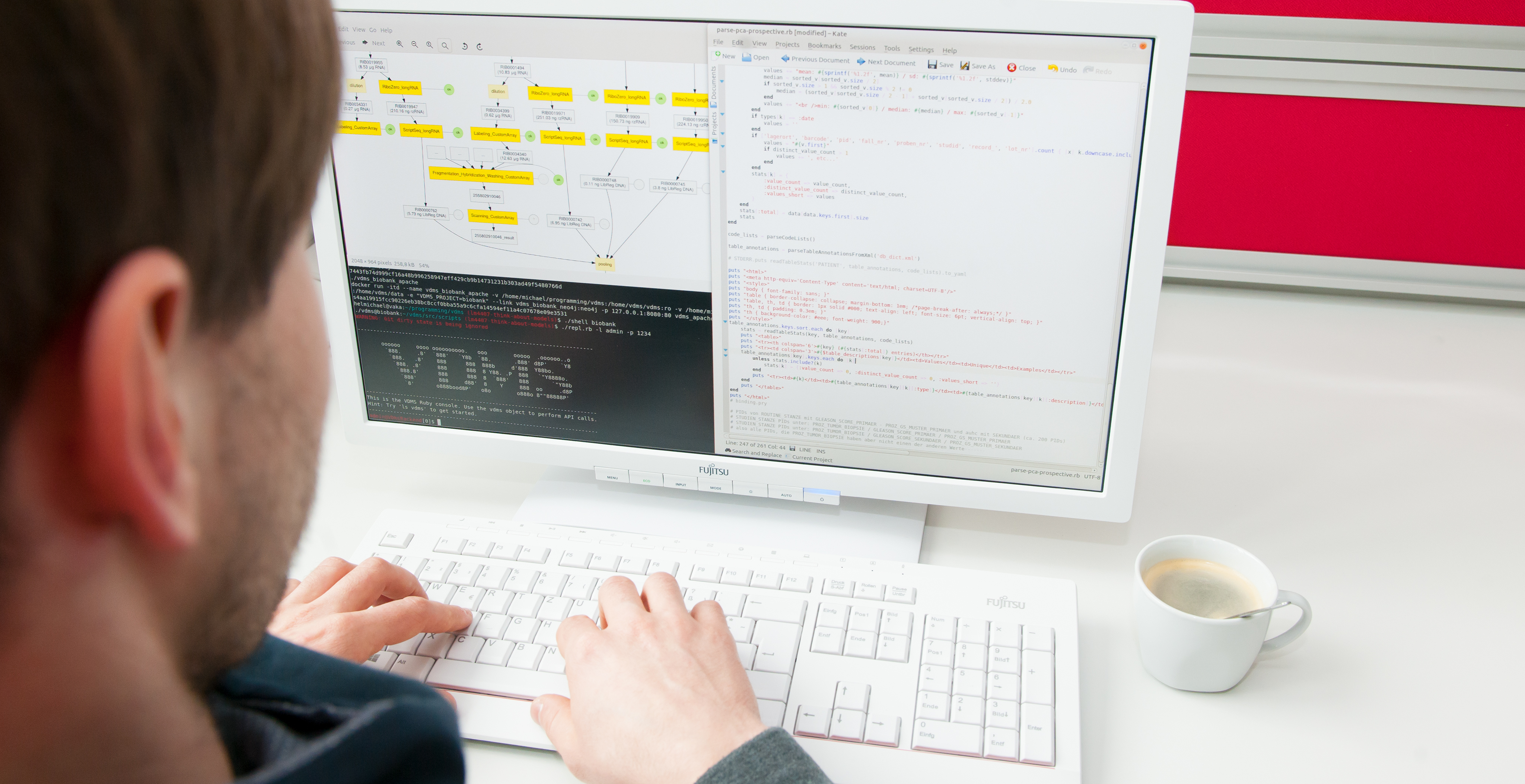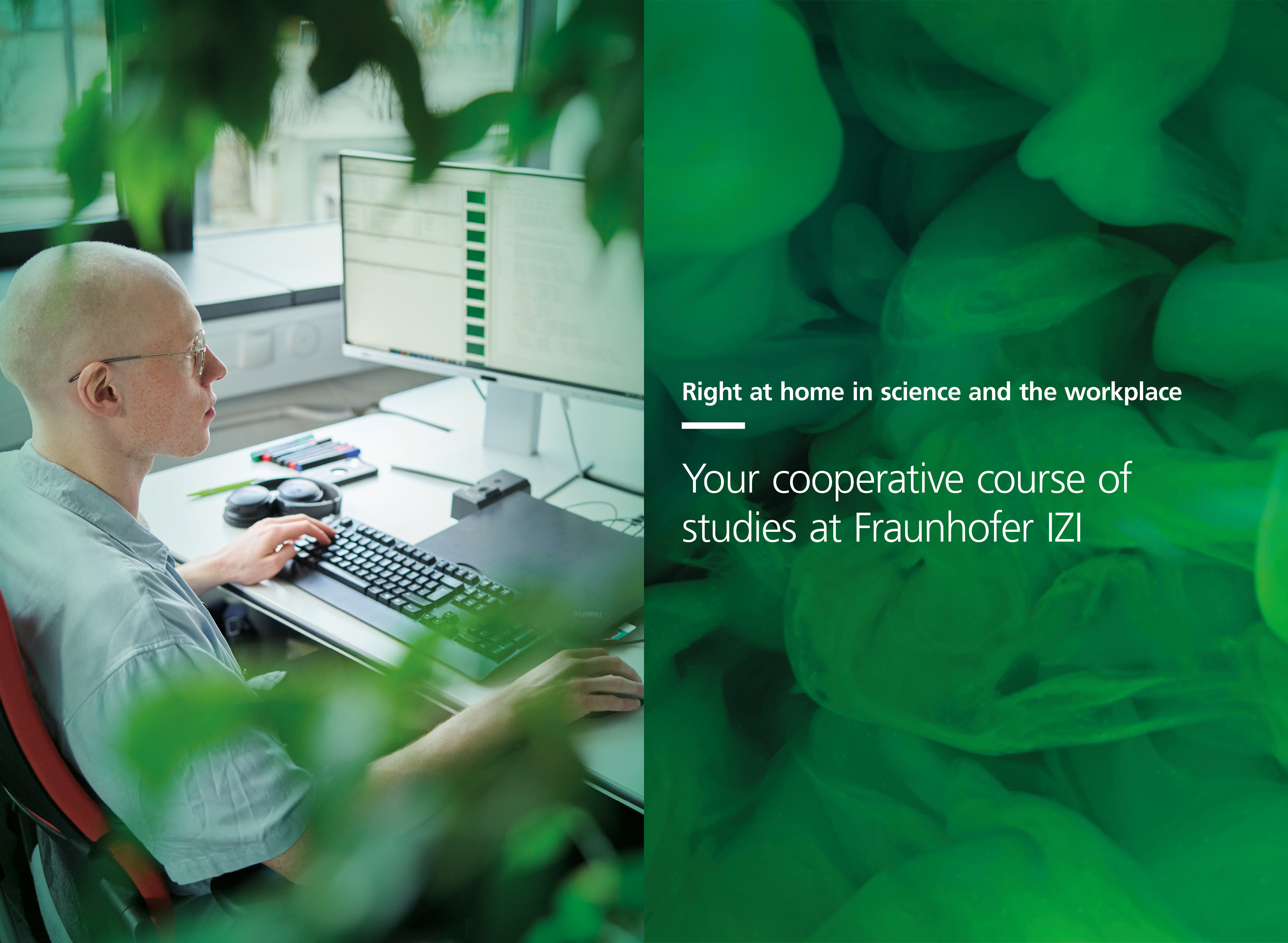You have graduated from school and are ready to go to university but feel unsure about just continuing solely to learn? Would you like to study while gathering practical experience and optimally preparing for your future career? If you want to boost your career right from the outset, a cooperative course at Fraunhofer Institute for Cell Therapy and Immunology might be exactly right for you. Here, you combine theory lectures at a vocational academy with working on fascinating research projects. You switch between theory and practical phases at intervals of approximately three months – which means that you can experience the development of innovations in medicine for the future - first-hand. Together with our institute’s scientists, you study the subject in depth and make a contribution to progress in biotechnology and digital medicine.
Cooperative course

Privacy warning
With the click on the play button an external video from www.youtube.com is loaded and started. Your data is possible transferred and stored to third party. Do not start the video if you disagree. Find more about the youtube privacy statement under the following link: https://policies.google.com/privacyCareer with Fraunhofer
Cooperative studies to become a bachelor of science in biotechnology (laboratory and process engineering)
How can donor organs be tested for their compatibility with patients before transplantation? How can vaccines be produced efficiently without the use of harmful chemicals? How can DNA be used to produce origami structures? Biotechnologists at the Fraunhofer Institute of Cell Therapy and Immunology can answer these and many other questions. Would you like to be part of these research efforts? In this case, a cooperative course of study in biotechnology at our institute can help you to do just that.
The biotechnology course has an interdisciplinary structure giving you insights into various fields and subjects. At the vocational academy, you will get to know the scientific basics in chemistry, physics and biology. Moreover, the curriculum also includes measurement technology and process technology content. The biotechnology course focuses on researching living organisms with the aim of developing substances or devices which can be used for medical, industrial or agricultural purposes. In this respect, the focus can be on the development of new drugs and treatment methods or on improving diagnostics, as it is at Fraunhofer IZI. Moreover, biotechnology methods are also used to breed new plant species. Plus, many everyday items, such as detergents or cosmetics, contain biotechnology.
In the practical part of your course, you will use molecular-biological and genetic engineering methods on plant, animal or human cells in the laboratory. You will then use specific software which you are already familiar with from bioinformatics courses to analyse your results. You will get to know the mechanisms behind biotechnology production methods and the safety provisions in the lab environment, as well as important quality standards. In your everyday work, you will use a range of devices and systems which you will adjust, operate and maintain for your experiments. In addition, some desk work is involved in documenting your experiments.
Do you want to help to design the future? Well, you can start with your own future by choosing a cooperative course in biotechnology at Fraunhofer!
The most important information in a nutshell
This is what you will learn:
- how to examine microorganisms, fungi, plants, animals and humans from whole organisms down to individual cells and their components,
- the most important technological processes and analysis methods from the fields of biochemistry, micro- and molecular biology, pharmacology and much more,
- how to use bioinformatics software and digital tools for research purposes,
- how to monitor the quality of production methods, implement quality standards and
- how to operate and maintain technical laboratory equipment.
This is how the program works
The academic year always begins on 1 October at Duale Hochschule Sachsen in Riesa. This is where you will complete the theory blocks and sit your examinations. Approximately every three months, the theory part alternates with practical phases in our laboratories. The courses usually take three years or six semesters and they conclude with the academic degree of a bachelor of science. Our students in the cooperative courses are remunerated in accordance with the Collective Agreement for Public Services Trainees (TVAöD); in addition, we pay all your tuition fees.
Requirements
- University of applied sciences entrance qualifications or general higher education entrance qualifications (e.g. A-levels or Abitur)
- Extensive interest in science subjects, such as biology, chemistry and physics
- Interest in machine processes, plants and various devices used in laboratory work
- Persistence, care and precision in the execution of experiments, a technical understanding and an analytical approach to your experimental results

Cooperative studies to become a bachelor of science in computer studies
The computer goes on strike, the internet connection is poor, the newly downloaded program doesn't work as it should – and you're always the first point of contact for your family and friends? Do you like tinkering with your private PC and lose yourself in the world of zeros and ones? With the dual study program in computer science at the Fraunhofer Institute for Cell Therapy and Immunology, you can turn your passion into a career – and with real added value for the medicine of tomorrow!
In the cooperatice studies program in computer studies, you will delve deep into the spheres of modern communication technology. At the University of Cooperative Education, you will learn how to further develop IT systems and applications, plan software and build websites. You will study different areas of computer science: in practical computer science, you will learn how to program and work with operating systems. Theoretical computer science deals with algorithms, i.e. instructions or rules that are used by a computer to perform a specific task or solve a problem. The structure of a computer, the hardware, is the focus of computer engineering. To enable you to take on responsible tasks in your future working environment, your curriculum will also include subjects such as business administration and law. Depending on your interests, you can deepen your knowledge of electrical engineering, automation technology and mechatronics during your studies or focus on graphics, software testing and data protection.
In your day-to-day work at Fraunhofer IZI, you will develop new algorithms and software for future applications in personalized medicine. You will gain a wide range of insights into our application-oriented technologies in the various research fields, learn about current problems in digital medicine and develop new solutions together with your colleagues.
Cracking tricky problems is your specialty? Then become part of the digital revolution with your cooperative courses in computer studies at Fraunhofer!
The most important information in a nutshell
This is what you will learn:
- how to program and expand software and applications and how to quickly process and evaluate large amounts of information digitally
- everything you need to know about databases, operating systems and networks
- what a computer looks like on the inside and how it works
- how you can develop new solutions to complex challenges in digital medicine using a logical approach
- what new trends in artificial intelligence and machine learning the future holds for us
- which security and data protection guidelines need to be observed in IT
This is how the program works
The academic year always begins on October 1 of the current year at Duale Hochschule Sachsen in Leipzig. This is where you complete your theoretical phases and examinations. Approximately every three months, this part alternates with practical phases at our research facility. The duration of the course is usually three years or six semesters; at the end of the course, you will receive a Bachelor of Science degree. Our students in the cooperative courses are remunerated in accordance with the Collective Agreement for Public Services Trainees (TVAöD); in addition, we pay all your tuition fees.
Requirements
- University of applied sciences entrance qualifications or general higher education entrance qualifications (e.g. A-levels or Abitur)
- Enthusiasm for computer science, new technologies and innovations and enjoy cracking logic puzzles
- Patience, perseverance and concentration, even if something doesn't work straight away
- Willingness to continuously learn new programming languages and development methods and adapt to changes

